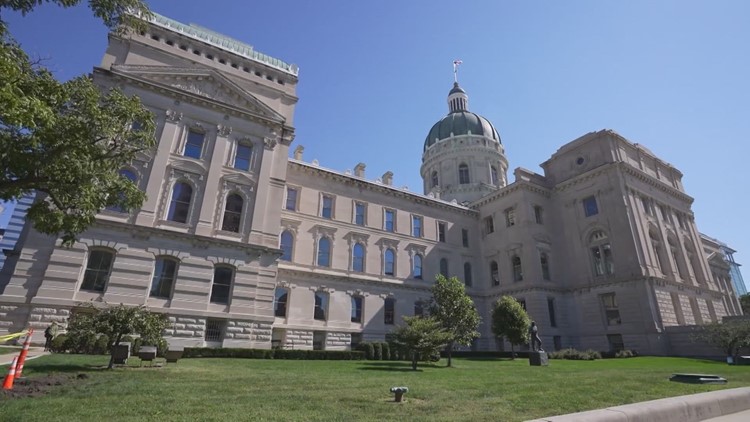INDIANAPOLIS — Indiana is turning into an abortion island. Girded by gerrymandered General Assembly maps, along with an anemic and broke Democrat Party, a year ago Republican super majorities passed and Gov. Eric Holcomb signed some of the most restrictive anti-abortion measures in the United States.
But on a single-issue referendum vote on Tuesday, Ohio voters followed a national trend, rejecting by a 57% no vote a measure that would have increased the threshold for constitutional amendments from a simple majority 50% plus one to 60%. That sets the stage for November, when voters in our red state neighbor to the east are expected to ensure continued abortion access.
According to Ballotpedia, in 2022, there were six ballot measures addressing abortion — the most on record for a single year. Measures were approved in California (67%), Michigan (57%), and Vermont (77%) to preserve abortion access. Measures for constitutional amendments outlawing most abortions were defeated in Kansas (59%), Kentucky (52%), and Montana (53%).
In Kansas and Kentucky — which are as conservative as Indiana, though both have Democrat governors — voters rejected ballot measures to state that nothing in their state constitutions creates a right to abortion or requires government funding of abortions. In Kentucky, 52.3% rejected a constitutional amendment. In Montana, voters rejected a measure called the Born-Alive Infant Protection Act.
In Michigan, 56.7% passed Proposal 3, the Constitutional Right to Reproductive Freedom in 2022.
While Michigan, Ohio and Kentucky have a constitutional amendment process that requires a citizen signature threshold to appear on a ballot, Indiana's process requires two bills in separately elected General Assemblies to pass a constitutional amendment qualify for the ballot. That will not happen on the abortion issue in the super majority House and Senate.
But Indiana voters are not unlike those in Michigan and Kansas. In a 2022 Hoosier Poll by Ball State University's Bowen Center, 56.7% — identical to the Michigan result — believe abortion should be legal in all or most cases. Most Hoosiers — more than 76% — find abortion to be an important or at least somewhat important issue. Hoosier voters were almost even split on whether they would vote for a candidate that has a different stance on this issue, with 48% saying they would not and 52% saying they would or might still vote for such a candidate.


What does this mean for Hoosiers?
Abortions had been legal up to 22 weeks. But after Gov. Holcomb quietly signed SEA 1ss last August (there was no ceremonial gathering with pro-life supporters for the signature), or instances of rape or incest, abortion will only be allowed up to 10 weeks. Fetal anomaly abortions are only permitted up to 20 weeks.
This means that for Indiana women seeking an abortion, instead of traveling to Indianapolis, Bloomington or South Bend, they will have to drive to Chicago, Kalamazoo, Lansing or Louisville, and after the expected passage of abortion access amendment in November, to Ohio cities like Toledo, Dayton, Columbus or Cincinnati.
As for the political atmosphere, Republicans seeking the 2024 gubernatorial nomination — U.S. Sen. Mike Braun, Lt. Gov. Suzanne Crouch, Fort Wayne businessman Eric Doden, and former attorney general Curtis Hill — are all ardently pro-life.
The lone Democrat running, former Republican superintendent of public instruction Jennifer McCormick, is pro-choice. She told me last June, "I do support the standards that were set by Roe. I support a woman’s right to choose."
McCormick's campaign has had little traction, after she posted just $250,000 on her mid-year campaign finance report (compared to well over $4 million for Braun and $3.8 million for Crouch and Doden).


Indiana Right to Life CEO Mike Fichter noted that not one legislator who voted for SEA 1ss lost in 2022. “In spite of predictions by some pundits and pollsters that Indiana went too far in its approach to protecting unborn children, yesterday’s election results serve as a reminder that Indiana is a pro-life state,” Fichter said the day after the election.
Beyond McCormick's gubernatorial candidacy, few Democrats are stepping up, though many campaigns begin to take shape between Labor Day and next February's filing deadline. One is Matt McNally, who is seeking a rematch against State Rep. Jerry Torr, R-Carmel, after he lost in 2022 by a 52.4% to 47.6%. Citing "supermajority rule" since 2014 and the signing of SEA 1ss, McNally said, "I believe decision makers at our state capitol have embraced extreme policies that are out of step with our Carmel and Westfield communities.”
Beyond Indiana, the recent referendum results have gotten the attention of Republicans. “The Ohio result tonight, coming on the heels of the shellacking in Michigan and the unexpected loss in Kentucky, needs to be a five-alarm fire for the pro-life movement,” Patrick Brown, a conservative scholar at the Ethics and Public Policy Center, tweeted late Tuesday.
“There shouldn’t be any sugarcoating over what happened last night. It was a major setback in what became a very public fight between pro-choice and pro-life groups,” Bill Stepien, the campaign manager for former President Donald Trump’s 2020 campaign, said on Fox News. “This happened in Ohio, which is not a pink state anymore. This is a state that is red.”
Brian Howey is senior writer and columnist for Howey Politics Indiana/State Affairs. Find Howey on Facebook and Twitter @hwypol.



